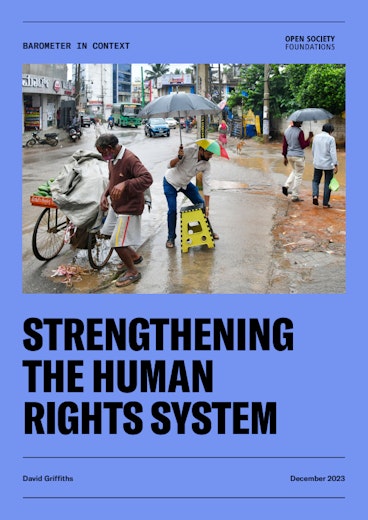75 Years of the Universal Declaration of Human Rights
By Natalie Samarasinghe

As crises engulf the world, the 75th anniversary of the Universal Declaration of Human Rights (UDHR) must spark more than perfunctory reflections. Climate breakdown is upon us. Conflict is proliferating. Civilians are targeted and the killing of children seemingly tolerated. Authoritarians loom large in forthcoming elections; democracies openly flout international law; and human rights are challenged by governments of all stripes. Poverty and hunger are on the march again while technology is poised to upend our societies.
Our failure to put in place just and effective solutions has undermined trust in leaders and institutions. There is a widespread perception that human rights are applied selectively—within and between countries. At the national level, women, minorities, and those on low incomes are less likely to enjoy their rights, from access to justice to access to health care. Internationally, the charge of double standards echoes loudly as the governments that pushed hard to protect civilians in Ukraine and Israel now fail to do the same for civilians in Gaza and many other places. Meanwhile, collective rights, to a healthy environment, for instance, are deprioritized across the world.

As a result, activists and autocrats have become unlikely bedfellows in critiquing the international human rights framework of which the UDHR is a cornerstone. They argue that it reflects a narrow Western understanding of rights that lacks legitimacy and—increasingly—impact as the framework’s other cornerstone, the post-1945 international order, has frayed.
It is a persuasive argument. Naming and shaming, for years the go-to tactic for campaigners, falls flat when the targets are shameless. The rallying cry of human rights has been diluted by accusations of elite capture and fringe appropriation. Erstwhile defenders of rights seem diminished or compromised. The multilateral system anchoring rights is itself in crisis, its lack of enforcement mechanisms and funds now compounded by a failure to keep up with challenges such as artificial intelligence.
But this is not the whole story. The Open Society Barometer, a poll of over 36,000 people in a representative group of countries, found that most people believe in the value of human rights. Over 70 percent said that human rights “reflect the values I believe in” and are “a force for good” in the world.
Actors such as human rights lawyers, NGOs, and international organizations continue to provide hope, support, and redress to those seeking justice and protection. And they are joined by a growing cohort of others, from rural communities to indigenous peoples, political and social movements. They may not use the language of rights but their work is grounded in them. They cannot afford to have theoretical debates about the relevance of the UDHR. They need support and solutions.
To mark the UDHR’s anniversary, Open Society commissioned a paper on what those solutions might look like, written by David Griffiths, an advocate and policy expert with more than two decades of diverse experience across the human rights movement. His paper, Barometer in Context: Strengthening the Human Rights System, sets out a series of proposals for how to make this moment count, including prioritizing economic inequality and climate change, exposing the failure of authoritarians to deliver, defending civic space, rethinking migration, widening accountability, and strengthening the human rights system.

Natalie Samarasinghe is the global director for advocacy at the Open Society Foundations.


